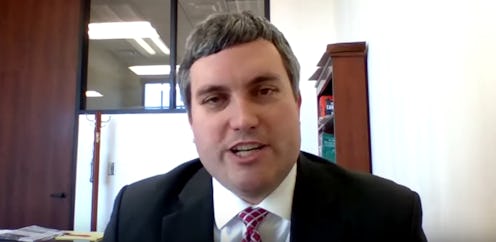News
One Of Trump's Judge Picks Never Bothered To Mention His Wife Works For The White House
One of President Trump’s nominees to a federal judge position reportedly left a pretty important piece of information off a Senate questionnaire. Brett Talley failed to mention a potential conflict of interest, according to the New York Times: His wife, Ann Donaldson, is the chief of staff to the White House counsel. Talley is currently awaiting a Senate confirmation vote to become a federal district judge in Alabama. The vote could come as early as Monday, but it could be derailed by this latest revelation about the 36-year-old lawyer.
Some are suggesting that Talley's failure to mention his wife on a congressional document, which asked him to list those who would be “likely to present potential conflicts of interest," could be cited by lawmakers as a reason to block his nomination. According to Charles Gardner Geyh, a professor at Indiana University's Maurer School of Law, leaving out that kind of information could be a harmless mistake—or it could be an outright lie. While Gayh tells Bustle he can't say exactly what type of omission Talley's is, he says it illustrates the almost careless attitude toward ethics that many members of the Trump Administration have shown so far. "This is just one example of indifference to normal ethical requirements," Geyh says.
On Sunday, The Washington Post reported that Talley "has practiced law for only three years and has yet to try a case," a fact that many experts say makes him unqualified for a lifetime federal judgeship. The American Bar Association (ABA) also gave Talley a "Not Qualified" rating earlier this month, based on interviews with others in the Alabama legal community. In fact, Talley's resume is so thin for a nominee to a federal judgeship that some are arguing that his wife's job as the chief of staff to the White House counsel, Don McGahn, might have something to do with his nomination.
"It raises the issue of cronyism, certainly," Geyh tells Bustle, adding that if Talley included the potential conflict of interest on his Senate questionnaire in the first place, it likely wouldn't affect his nomination. Geyh says Talley's failure to do so, however, seems sloppy. "I don't know how he could overlook it — in the abstract, I dont think we can make too much of it, but in this context, it's more serious, particularly because it involves an underqualified lawyer whose only credential seems to be his proximity to power," he says.
Kristine Lucius, the executive vice president for policy at The Leadership Conference, worked on the Senate Judiciary Committee for more than 14 years. In that time, she read a lot of documents like the one Talley filled out. She tells Bustle his relationship with a member of the White House Counsel's office isn't as troubling as his failure to disclose it. "Of course there are lawyers married to other successful lawyers. There are also judges who have spouses who are lawyers," she says. "But for someone to not disclose a potential conflict of interest and pretend it doesn’t exist is much more troubling."
As Lucius points out, it's a difficult question to misunderstand. "The first four words are 'Name a family member,'" she says. "If this nominee is so unwilling to disregard the plain words of this question, how can we be confident he will regard the plain words of a statute?"
Beth Rosenson, a political science professor at the University of Florida, tells Bustle that the omission is probably not illegal — but that doesn't make it ethical, either. "It raises the question of why he was chosen for the position in the first place," Rosenson says. "He's an unusual nominee in that he's never presided over a trial — you can't discount his Harvard Law degree, but it's pretty much unheard of for someone to be nominated for a federal judgeship without having presided over a trial."
Talley's relationship with a member of the White House Counsel's Office could cloud his judgement, Rosenson adds: "Let's say he was asked to rule on an executive order that Trump put forward. You might question whether he could rule without factoring in his wife's role in the Administration."
The Trump pick has a few other controversies in his past that have come to light in recent months. Talley once referred to the Democratic nominee for President as “Hillary Rotten Clinton" on Twitter. And in January 2013, just a month after the Sandy Hook Elementary School shooting in Newtown, Connecticut, Talley wrote a blog post titled, “A Call to Arms: It’s Time to Join the National Rifle Association.”
Of course, that tweet and pro-gun rights blog likely didn't do much to affect Republicans' support for Talley. A number of Trump's current Cabinet members, including Attorney General Jeff Sessions, also made alleged errors on Congressional documents, and Trump himself has been dogged by accusations of conflicts of interest. So whether or not failing to mention that his wife works for the White House will affect Talley's shot at becoming a federal judge remains to be seen. But should his nomination be rejected, or if he's forced to withdraw his name, Talley does have a side gig to fall back on: moonlighting as a horror novelist.
